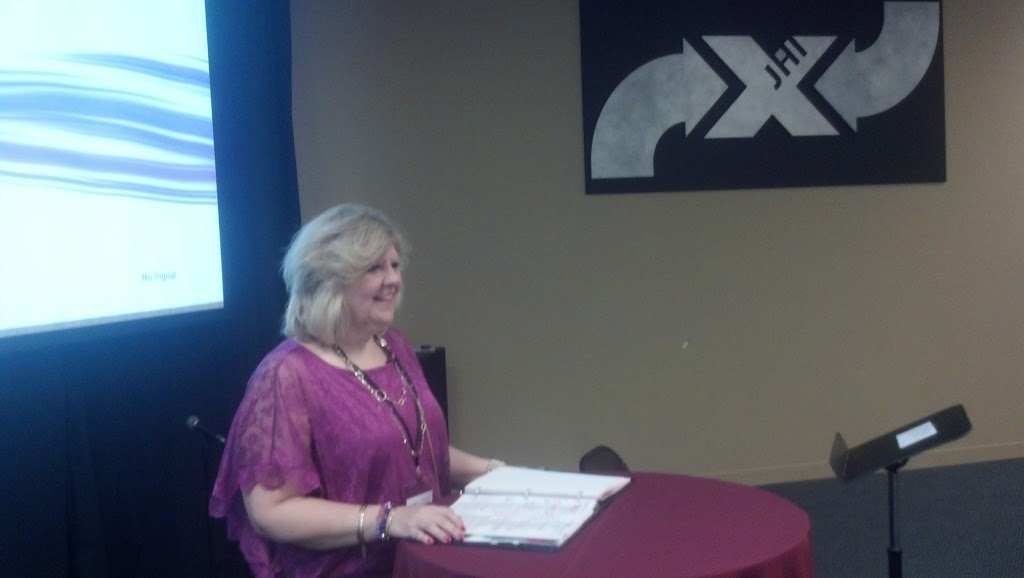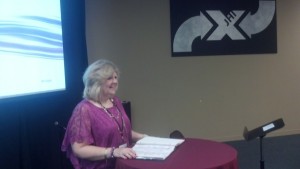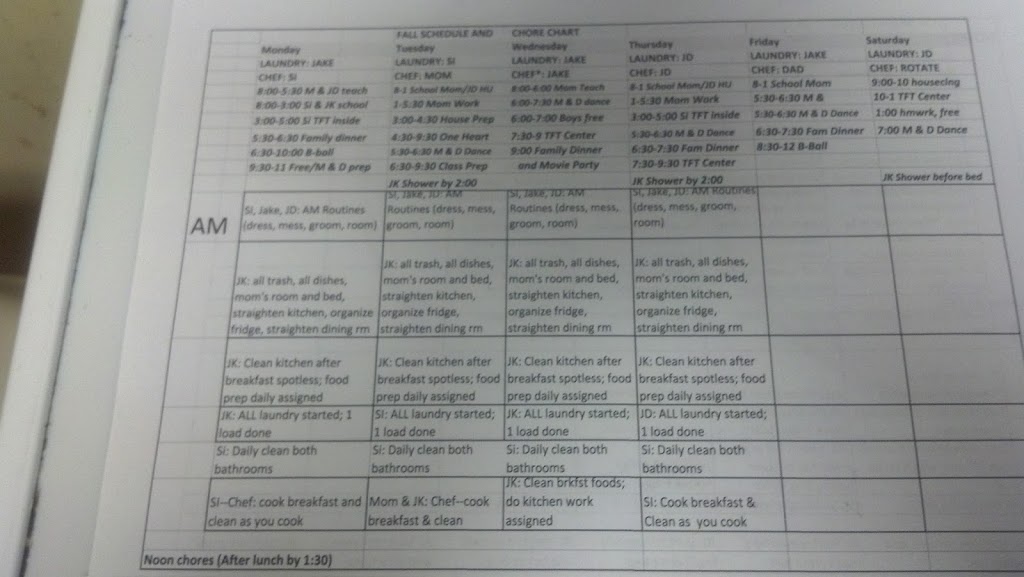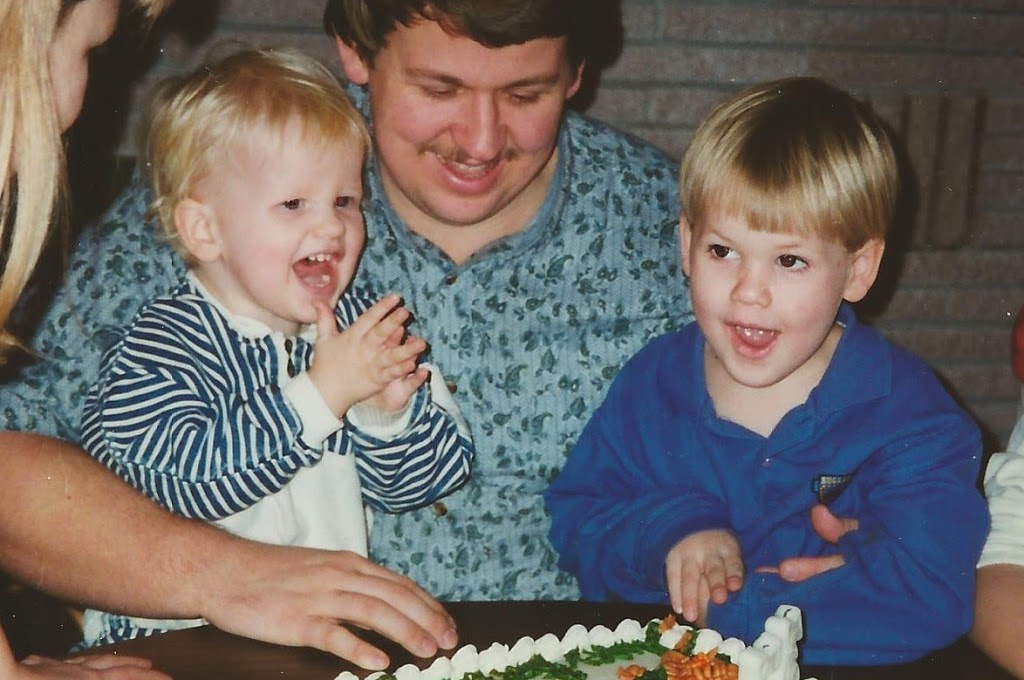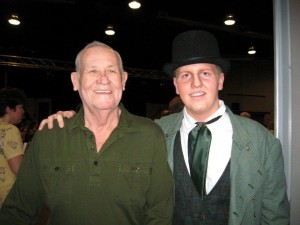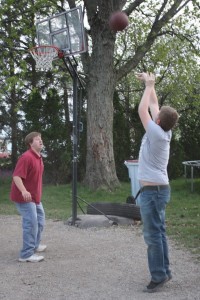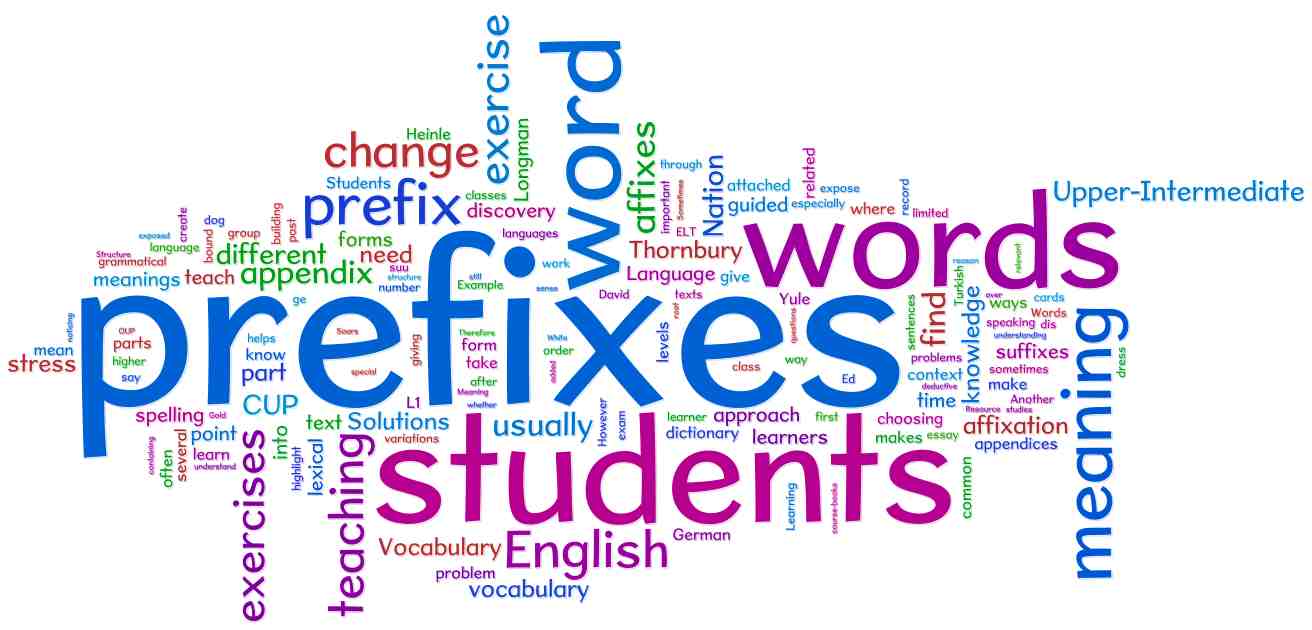
by Donna | Sep 10, 2013
 |
| Speaking about “Building Study Skills and Comprehension” at a conference |
There are many aspects of teaching a child how to learn, one of which is working to increase our children’s comprehension. When people have good comprehension, they can learn anything, anywhere, anytime.
There are three primary ways that we have worked to increase our children’s comprehension: (1) Discussion with parents and those more knowledgeable than the child; (2) Good questions following reading or discussions; and (3) Provide a rich background of experience.
The first two of those go hand-in-hand. Discussion of everything with our children from very young ages has given our kids experiences in areas that they would normally not have experiences in. It gives us the opportunity to teach all the time—and gives them learning hooks that they create with the discussion material to bring into other learning situations.
Good questions, not just rote questions, help the student think more deeply about subjects and allow you to observe his thought processes and help them along. Lastly, a rich background of experience gives your student the edge in learning any subject. Like discussion, it gives a child more knowledge, more background, more information to bring into future learning scenarios.
I am adding some information about teaching children how to learn, good materials, links to articles, etc., in the sidebar of this article for those who would like to study this further. Just being aware of always teaching our kids how to learn, how to study, how to research, how to further their understanding is a big step in teaching kids how to learn.
SIDEBAR….
Tips and Links for Teaching Children How to Learn
~People often ask us what we would have done differently in our homeschool. One of the things I would have done differently is that every child, every year would have done a thinking skills book of some sort from the Critical Thinking Company: https://www.criticalthinking.com/index.jsp?code=c

by Donna | Sep 7, 2013
 |
| When our children got older, I moved out of colorful chore charts on poster board types of display and into typed charts created in Excel in report covers. |
When it comes to chores, I am thankful that I learned the approach that we have used for the past twenty years plenty early in my homeschooling tenure:
1. Attach three different chore sessions to twenty to thirty minutes prior to each meal.
2. Use one of your “chorers” for meal preparations for that upcoming meal. (Eventually, our kids did breakfasts and lunches completely by themselves for the family–and either did dinner with me or rotated through and took a different night each week as they got older.)
3. Put the most crucial chores in the first chore session–the things that need done every day regardless. For us, this meant one load of laundry, one load of dishes, trash throughout the house, wipe down bathrooms, get out/start something for evening meal, and fix breakfast. This way you will almost always get to the priorities (“dailies”)
4. In the second chore session, put more dailies and a couple of weekly tasks. (For us, this meant another load of dishes, laundry, and trash; lunch preps; possibly baking; and another weekly or two, such as dusting and vacuuming, cleaning out fridge, etc.)
5. In the third chore session, I put the things I only dream of getting to and dinner preps. (I always had a child in the kitchen with me each evening as I prepared dinner–unless the child fixed it himself or herself!)
6. Before each chore session, I called out “Room to Room”–which meant that each person should go through the main rooms and pick up what they have out. This allowed the chorer for that room to dust, vacuum, etc., without having to pick up first.
The key to successful chores, in my opinion, include the following:
A. Do dailies daily! Do not skip dailies. Do not try to do anything else until the dailies are down pat.
B. Never miss the first two chore sessions!
C. Have everybody work the entire chore session. (If someone got done early, he came to get another task or helped someone else. This wasn’t a race–it was a daily lifestyle that helped us have time for homeschooling and all of the wonderful teaching, heart training, and family times that we wanted to have.)
D. Don’t make it the least bit optional. After a couple of months of this lifestyle, my kids never even questioned whether they had to fold and put away three loads of laundry that day or fix lunch every day or cut up a fridge full of veggies. It was a way of life–a way of life that made our family successful.
E. Don’t eat until the work is done!
F. Have I mentioned not to skip?

by Donna | Aug 24, 2013
A is for AFFIRMATION!
I LOVE TO WATCH YOU…
Article from blog:
Affirmation. Words of encouragement. Words of praise. Words of confirmation. Words of affection. Words of pride. Words of belonging. These all describe that one word–affirmation.
I recently read an article about a study of hundreds of college athletes that lasted over three decades. In this article, “What Makes a Nightmare Sports Parent and What Makes a Great One.” these college athletes described two things that are poignant for parents of all children, including non-athletes.
The first question they answered was “What is your worst memory from playing youth and high school sports?”
The majority of those surveyed said, “The ride home from games with my parents.”
(If you have read much of what we have written or heard us speak often, you know that we focus on riding with our children in the van or car as one of the key opportunities to teach, affirm, talk, love, and train. It breaks my heart that this “sacred time” is remembered as one of the most dreadful times for these hundreds of athletes.)
Of course, we can all imagine why–because there probably isn’t a parent reading this (author included) who hasn’t come down on a child on the drive home from something about his performance–teacher conferences, speech contest, debate tournament, soccer game, swim meet, even pick-up basketball games are all opportunities to “teach” our child what he did “wrong” in the aforementioned event.
My husband, who is truly the best dad I know, one who talks to his kids on the phone and in person quite literally hours every day, even does this, so I know it is hard to conquer. And it isn’t always the parent’s fault either–as I know our kids usually probe on the way home from a performance, sermon, or song. They ask us questions that make us feel like we should be “teaching” at that time.
However, we really need to resist the urge to teach at that time. My experience has been that they ask and ask, but they really don’t want a lesson. They really just want to hear the positive at that time. I have to remind myself that there will be time for teaching and lessons later–when the performance, sermon, or song isn’t so fresh.

The study went on to prove this point further by telling how the kids described their joy over grandparents attending their sporting events. It seems that grandparents are more likely to watch, cheer, and then praise–with no lessons or strings attached.

Turning from the negative and what not-to-do, to the positive, these same athletes were asked what their parents did right–what made them feel good about themselves and their performances. The majority of them said that they were filled with joy when their parents simply said six little words:
“I love to watch you play.”
No lessons, lectures, or analyses. Just six simple words that made hundreds of college and professional athletes look back on their time following sporting events with their parents fondly.
And six little words that we can use to affirm our children all the time.
I was happy to read this article because one of my favorite buzz lines after my kids perform is
I could watch you _________________ forever.
I could watch you dance forever. I could watch you sing forever. I could watch you preach forever. I could watch you teach forever. I could watch you act forever. I could watch you direct forever. I could watch you lead forever. I could watch you play forever. I could watch you study forever.
The thing about these lines—I love to watch you…. or I could watch you ….. forever—is that our child doesn’t have to be the best to say these things. He doesn’t have to have just played a perfect game. He doesn’t have to have just scored the winning run. He doesn’t have to have given a flawless performance.

He is our child. We love to watch him grow, do, be, become. We are saying that the child is so amazing to us–without being the gold medal winner. We are saying that he is important. That we want to be with him. That we love to watch him do what he loves to do.
We are affirming. With six little words.
I love to watch you….
Link for original article:
https://characterinkblog.com/i-love-to-watch-you/
A is for AFFIRMATION!

by Donna | Aug 24, 2013
 |
| Edudemic (clip art) |
B is for BACK-TO-SCHOOL!
Do you start back on the traditional school schedule? Or do you school in the summer to get some days in? Or do you school year round and take breaks throughout the year?
Homeschooling provides flexibility in all areas (not just starting school but literally EVERYTHING) that we don’t even begin to appreciate fully. (I didn’t until my kids started taking college classes, and they were so locked in to schedules and no time off!!!!)
B is for BACK-TO-SCHOOL!
Do you have a command center? Regardless of whether you use charts, sticker posters, wipe and write, or clip boards for your schedule/chores/organizational systems, I recommend you follow this one tip first:
Get the first hour of the day down pat before you try to “perfect” everything else.
When the first hour of your day is good, the whole day can be good!
https://www.remodelaholic.com/2013/07/family-command-centers
B is for BACK-TO-SCHOOL!
While we are blessed not to have to buy, buy, buy…clothes, supplies, etc., every August just because everybody else is (sometimes I do think it would be fun to go “back to school” clothes shopping with the kids though!), do pay attention to the sales during this time.
For example, we use a lot of three-pronged, two-pocket folders for each monthly unit of work (for storage when the month is done), and those are available now for fifteen cents each vs. up to sixty cents each during the “off season.”
Plus, I just have to get some scented markers, cool sticky notes, or other fun thing for the teacher!

by Donna | Jul 31, 2013
The prefix ir is an interesting prefix for a number of reasons:
1. It means not. There are many prefixes that can mean not, such as de, a, un, non; however, ir also means not, which is interesting to me because I don’t think it sounds like it should mean not! To me, it sounds like it should mean again or repeating or something besides not!
2. It only comes before base words that begin with R. In other words, you do not put ir in front of most any word to mean not, like you often do with un or non.
3. This isn’t really interesting–but I like to say it whenever I teach about prefixes. A prefix is a letter or group of letters that you “affix” (which is why it and suffixes are called affixes) to the beginning of a word. It is important to remember that a prefix does not change the spelling of the base word. That is especially crucial in spelling ir words because the ir precedes an R already–and you must keep the base word’s spelling, so when you add this prefix to a word, you will ALWAYS have two R’s in a row: irregular, irresponsible, etc.
4. It is most often put before a word that is should never come before: regardless. We hear people constantly say irregardless, which is, of course, an oxymoronic word because less means without (or not) and ir means not. I guess that makes it sort of like using a double negative! You do not put ir before regardless because regardless already means without regard. With ir in front of it, you are saying not without regard, I guess…. Anyway, irregardless is not a word. So don’t use it. Okay? 🙂
Note: It is correct, however, to use irrespective, which is a substitute (some of the time) for when you are tempted to say irregardless.
However, there are many base words that begin with R that can have ir put before them to mean NOT or the opposite of what the base word means before ir is added to it.
Here is a list to get you started. Notice how if you take the ir off, you have a positive base word (or one that means yes–yes regular, yes responsible, yes revocable, etc.) However, with the ir, the word means not—not regular, not responsible, not revocable, etc.
Remember: You know more than you think you know!
And remember: Use what you already know to learn even more!
irregular
irresponsible
irrevocable
irrefutable
irradiate
irreconcilable
irredeemable
irreducible
irrefutable
irregularity
irrelevant
irreverence
irreligious
irreparable
irreplaceable
irreversible
irresolute
irretrievable
irresistible
Irrelevant

by Donna | Jun 25, 2013
Thirty-three years ago this fall, my husband and I (he, a twenty year old college junior and I, a seventeen year old high school senior) went looking for a church to get married in the next summer only to find two crucial things in our lives: salvation and mentors. In short, we found the church we wanted to get married in (a little white, country church with a CENTER aisle), got born again, and discovered the joy of mentors in our lives.
 |
| New Lisbon Christian Church, Union City, IN (pic taken 2013 when we visited it for our anniversary) |
For the next year prior to marriage, as well as in our first several years of marriage and child-bearing, we had three couples in our lives who helped us grow in our faith, showed us how to live the Christian life, and even taught us how to get along with each other at times! These couples were ten, twenty, and thirty years older than we–they were adults who had been “doing the stuff” of Christianity for many years. They took us under their wings and helped us grow in the faith.
Several years later, we moved away from the safety of our hometown nest, but we continued to find mentors. Some of these we saw only once a year or so. Others were close friends whom we did life with, had children with, and homeschooled with. Still others were “distant mentors”–those people whom you may or may not ever meet, but they impact you through their writing, speaking, and teaching–and you realize one day after many, many years, that your life would have been completely different (probably not for the best) if you had not “met” these mentors.
So when our children entered their teen years, we weren’t interested so much in peer or even “a few years older than our kids” mentors for them. We wanted them to have what we had, had. We already knew that our kids’ first–and longest-lasting–mentors would be us. We would make
the hard choices to give up other things to mentor and disciple our kids.
Then the older kids started to grow up and find mentors of their own–adults who had been doing the very things our kids wanted to do with their lives. And it was glorious to watch them have adults in their lives to show them things that we couldn’t show them or hadn’t experienced ourselves.
Our oldest child spent two school years (his high school senior year and his college freshman year interning at two different state capitols. His mentors were professionals, but he learned a lot and grew as a public servant during this time.
Our next two kids, two daughters who both wanted to go into ministry (one as a missionary and eventually a college professor of theology and/or church history and one as a disability ministry director) found an amazing mentor in our associate pastor who directed a two year ministry school at our church and oversaw the girls’ ministries. We credit him for our dyslexic daughter’s confidence to go all the way to a doctorate program (he told her countless times that with her skills and intelligence, she should never shoot for anything short of a doctorate degree in order to serve God fully with her whole self).
We also credit him with our other daughter’s successful disability ministry that she founded while still in high school under his mentoring/college program. When that daughter came to him after she had served at Joni and Friends and talked to Joni Ereckson Tada about her desire to serve the disabled (Joni told her to go home, talk to her pastor, and do it!), he led her through the correct channels to make it happen and oversaw and encouraged her every step of the way.
Our fourth child, third daughter, got involved in a drama ministry, The Academy of Arts in Greenville, SC, while she was still in high school. Before we knew it, she was being mentored and encouraged by the founder’s daughter and her husband (the current directors of the program) and spent three years interning there under that couple.To this day, every word that couple speaks to our daughter is like a balm to her soul, encouraging and deepening her in faith and in utilizing her giftings.
Here we are with our fifth child (second boy, age 20) and sixth child (third boy, age 18) who both found themselves in our new church’s praise team after a couple of months of attendance at this church. We, after only six months, are already seeing them encouraged by the worship pastor week after week and watched their ministry skills grow in the process.
Now you can see a glimpse into why adults mentoring our kids has been so important to us. We grew in leaps and bounds spiritually thanks to many people who saw potential in us, believed in us, and helped us grow into the parents, family ministers, and spouses that we are today. We wanted that same type of grown-up mentoring for our own kids.
Peer mentoring and encouragement is fine. Single young adults just a few years older than our kids themselves is also helpful to many. But for our kids to have grown, successful, dedicated adults take an interest in them and invest them has been absolutely priceless.
Recently, the aforementioned twenty year old who is a junior studying pastoral ministry came home from his first meeting with our preaching pastor bubbling over with excitement. He spent an hour recounting everything that he and the pastor said during their time together. I, too, was excited about his excitement, but my heart warmed most of all when Jonathan told me the question our pastor asked him: “Jonathan, how can I, as your pastor, help you become the pastor you want to be?”
